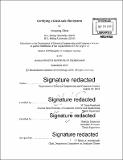| dc.contributor.advisor | M. Frans Kaashoek and Nickolai Zeldovich. | en_US |
| dc.contributor.author | Chen, Haogang | en_US |
| dc.contributor.other | Massachusetts Institute of Technology. Department of Electrical Engineering and Computer Science. | en_US |
| dc.date.accessioned | 2017-03-10T15:05:24Z | |
| dc.date.available | 2017-03-10T15:05:24Z | |
| dc.date.copyright | 2016 | en_US |
| dc.date.issued | 2016 | en_US |
| dc.identifier.uri | http://hdl.handle.net/1721.1/107325 | |
| dc.description | Thesis: Ph. D., Massachusetts Institute of Technology, Department of Electrical Engineering and Computer Science, 2016. | en_US |
| dc.description | Cataloged from PDF version of thesis. | en_US |
| dc.description | Includes bibliographical references (pages 93-99). | en_US |
| dc.description.abstract | File systems are a cornerstone for storing and retrieving permanent data, yet they are complex enough to have bugs that might cause data loss, especially in the face of system crashes. FSCQ is the first file system that (1) provides a precise specification for the core subset of POSIX file-system APIs; and the APIs include fsync and fdatasync, which allow applications to achieve high I/O performance and crash safety, and that (2) provides a machine-checked proof that its I/O-efficient implementation meets this precise specification. FSCQ's proofs avoid crash-safety bugs that have plagued file systems, such as forgetting to insert a disk-write barrier between writing the data from the log and writing the log's commit block. FSCQ's specification also allows applications to prove their own crash safety, avoiding application-level bugs such as forgetting to invoke fsync on both the file and the containing directory. As a result, applications on FSCQ can provide strong guarantees: they will not lose data under any sequence of crashes. To state FSCQ's theorems, FSCQ introduces the Crash Hoare Logic (CHL), which extends traditional Hoare logic with a crash condition, a recovery procedure, and logical address spaces for specifying disk states at different abstraction levels. CHL also reduces the proof effort for developers through proof automation. Using CHL, the thesis developed, specified, and proved the correctness of the FSCQ file system. FSCQ introduces a metadata-prefix specification that captures the properties of fsync and fdatasync, based on Linux ext4's behavior. FSCQ also introduces disk sequences and disk relations to help formalize the metadata-prefix specification. The evaluation shows that FSCQ enables end-to-end verification of application crash safety, and that FSCQ's optimizations achieve I/O performance on par with that of Linux ext4. | en_US |
| dc.description.statementofresponsibility | by Haogang Chen. | en_US |
| dc.format.extent | 99 pages | en_US |
| dc.language.iso | eng | en_US |
| dc.publisher | Massachusetts Institute of Technology | en_US |
| dc.rights | MIT theses are protected by copyright. They may be viewed, downloaded, or printed from this source but further reproduction or distribution in any format is prohibited without written permission. | en_US |
| dc.rights.uri | http://dspace.mit.edu/handle/1721.1/7582 | en_US |
| dc.subject | Electrical Engineering and Computer Science. | en_US |
| dc.title | Certifying a crash-safe file system | en_US |
| dc.type | Thesis | en_US |
| dc.description.degree | Ph. D. | en_US |
| dc.contributor.department | Massachusetts Institute of Technology. Department of Electrical Engineering and Computer Science | |
| dc.identifier.oclc | 972901378 | en_US |
